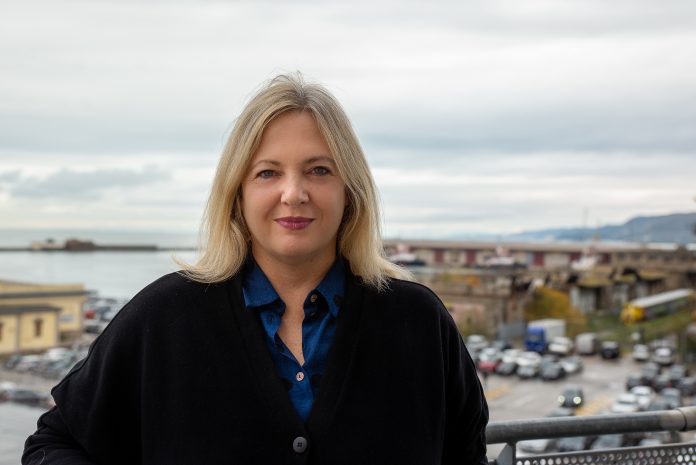by Julia Kyrdoda
In this exclusive interview, we delve into the world of the Trieste Film Festival with Nicoletta Romeo, a dynamic and visionary force behind the event. Born in the United States and raised in Italy, Nicoletta’s journey across countries and cultures has ignited a profound passion for cinema that knows no boundaries.
Q: Can you describe your path to your current role?
“I studied Foreign Languages and Literature at the University of Udine but always had a strong passion for cinema. I used to write about cinema for a university newspaper and regularly attended the university film clubs. After I graduated, I started to understand that this passion could become a profession. That is how I started to work with the festival in Trieste.”
At the beginning, Nicoletta’s role was diverse, involving collaboration with the festival catalog, assisting during the event, and gaining a comprehensive understanding of its inner workings. This hands-on experience shaped her vision for the festival’s future.
Q: What is the Trieste Film Festival all about?
“This festival has a very peculiar history behind it, even though many festivals in Italy are just events or entertainment. Trieste Festival is much more than that, as it has always managed to transform itself into the ideal setting for the celebration of cinema.”
The festival, born in 1989 during the fall of the Berlin Wall, holds a unique position by focusing on Central and Eastern European cinema. It goes beyond mere entertainment, creating a platform for cultural dialogue and supporting voices that often go unheard.
Q: What do you think made the Festival succeed?
“I think we have been very true to ourselves. We haven’t changed our identity. Our identity is plural because our focus is on Central and Eastern European cinema. And I think it’s very important not to change your focus; otherwise, people won’t understand who you are.”
Remaining authentic to its mission has been the key to the festival’s success. The unyielding commitment to showcasing the diverse cultures of Central and Eastern Europe has set the Trieste Film Festival apart.
Q: How has the Festival changed over time?
“The festival was born at a very pivotal moment in the last century, in 1989, the fall of the Berlin Wall. This is very symbolic, I think. Because that year we started opening and observing new European countries, cultures and cinema.”
Since its inception, the festival has evolved significantly, with an increase in participants, additional theaters, and the introduction of diverse programs catering to different age groups and communities. The festival now emphasizes inclusivity, with special screenings for hearing-impaired and blind audiences.
Q: What are your criteria for the selection of films for the Festival?
“A good film is, first of all, a film that shows originality. It should say something new about cinema and the world. It should leave you having a lot of questions, not a lot of answers. A good film won’t give you answers or easy answers. It should be disturbing at times.”
Nicoletta, assisted by a selection committee, looks for films that challenge the audience, offering new perspectives and leaving a lasting impact. Originality, thought-provocation, and the ability to evoke emotions are key criteria in the selection process.
Q: What have you found challenging in your work?
“The most difficult thing is to find funding. Although I think the situation is quite solid, I would say. The main sponsor is the region, which has always been very supportive. We have the Ministry of Culture. We’re one of the few festivals in Italy to be supported by Creative Europe, which is a European funding programme for film festivals.”
Securing funding remains a significant challenge, despite strong support from regional and national entities. Nicoletta envisions creating a broader network with private sponsors to enhance the festival’s reach and impact.
Q: Your work started as a passion, and how do you keep that passion despite all the challenges and difficulties along the way?
“In my case, it’s not work anymore. Basically, it’s the way I live, so it’s all blurred, there’s no boundaries between my public and private life. And it’s still a passion in my private life.”
For Nicoletta, the boundary between work and passion has dissolved. Cinema is not just a job; it’s a way of life. The immersion in the world of film continues to fuel her enthusiasm.
Q: From your experience, what are the essential qualities for success in any profession?
“First, you have to work a lot and be hardworking. It also means being open and listening to others, even the trainee who has just arrived. Learn from your mistakes. Failure is also very important because it means you can improve.”
Nicoletta emphasizes the importance of hard work, openness to learning, and resilience in the face of failure. Success, she believes, is a gradual and continuous process.
Q: What can we expect from this year’s Festival?
“This year our focus is on German women filmmakers. The competition sections will be the starting point for feature films and documentaries. And we will have a central piece, as we call it. This is the new film ‘Green Border’ by the Polish director Agnieszka Holland, which premiered in Venice a few months ago.”
The ongoing festival is an exploration of German women filmmakers, with a central spotlight on Agnieszka Holland’s impactful film addressing the plight of immigrants in Europe. The program includes a diverse array of events, from concerts and DJ sets to book presentations and master classes, ensuring a rich and immersive experience for attendees.
As the Trieste Film Festival continues to evolve, Nicoletta Romeo remains at its helm, steering the course towards a future where cinema serves as a powerful tool for cultural exchange and understanding.





























